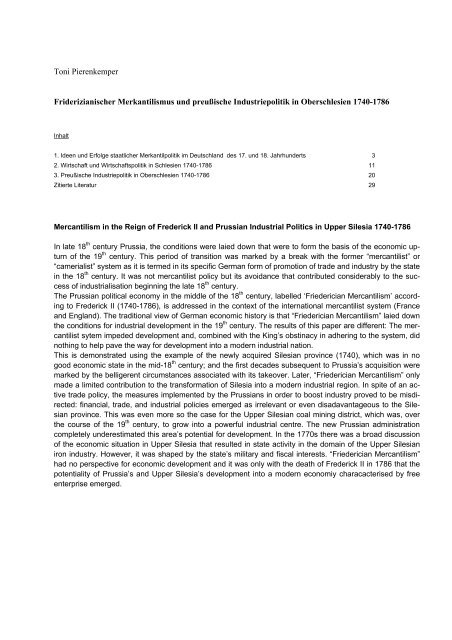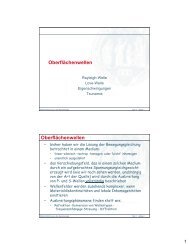Cologne Economic History Paper 01-2007 - Universität zu Köln
Cologne Economic History Paper 01-2007 - Universität zu Köln
Cologne Economic History Paper 01-2007 - Universität zu Köln
Sie wollen auch ein ePaper? Erhöhen Sie die Reichweite Ihrer Titel.
YUMPU macht aus Druck-PDFs automatisch weboptimierte ePaper, die Google liebt.
Toni Pierenkemper<br />
Friderizianischer Merkantilismus und preußische Industriepolitik in Oberschlesien 1740-1786<br />
Inhalt<br />
1. Ideen und Erfolge staatlicher Merkantilpolitik im Deutschland des 17. und 18. Jahrhunderts 3<br />
2. Wirtschaft und Wirtschaftspolitik in Schlesien 1740-1786 11<br />
3. Preußische Industriepolitik in Oberschlesien 1740-1786 20<br />
Zitierte Literatur 29<br />
Mercantilism in the Reign of Frederick II and Prussian Industrial Politics in Upper Silesia 1740-1786<br />
In late 18 th century Prussia, the conditions were laied down that were to form the basis of the economic upturn<br />
of the 19 th century. This period of transition was marked by a break with the former “mercantilist” or<br />
“camerialist” system as it is termed in its specific German form of promotion of trade and industry by the state<br />
in the 18 th century. It was not mercantilist policy but its avoidance that contributed considerably to the success<br />
of industrialisation beginning the late 18 th century.<br />
The Prussian political economy in the middle of the 18 th century, labelled ‘Friederician Mercantilism’ according<br />
to Frederick II (1740-1786), is addressed in the context of the international mercantilist system (France<br />
and England). The traditional view of German economic history is that “Friederician Mercantilism” laied down<br />
the conditions for industrial development in the 19 th century. The results of this paper are different: The mercantilist<br />
sytem impeded development and, combined with the King’s obstinacy in adhering to the system, did<br />
nothing to help pave the way for development into a modern industrial nation.<br />
This is demonstrated using the example of the newly acquired Silesian province (1740), which was in no<br />
good economic state in the mid-18 th century; and the first decades subsequent to Prussia’s acquisition were<br />
marked by the belligerent circumstances associated with its takeover. Later, “Friederician Mercantilism” only<br />
made a limited contribution to the transformation of Silesia into a modern industrial region. In spite of an active<br />
trade policy, the measures implemented by the Prussians in order to boost industry proved to be misdirected:<br />
financial, trade, and industrial policies emerged as irrelevant or even disadavantageous to the Silesian<br />
province. This was even more so the case for the Upper Silesian coal mining district, which was, over<br />
the course of the 19 th century, to grow into a powerful industrial centre. The new Prussian administration<br />
completely underestimated this area’s potential for development. In the 1770s there was a broad discussion<br />
of the economic situation in Upper Silesia that resulted in state activity in the domain of the Upper Silesian<br />
iron industry. However, it was shaped by the state’s military and fiscal interests. “Friederician Mercantilism”<br />
had no perspective for economic development and it was only with the death of Frederick II in 1786 that the<br />
potentiality of Prussia’s and Upper Silesia’s development into a modern economiy characacterised by free<br />
enterprise emerged.



